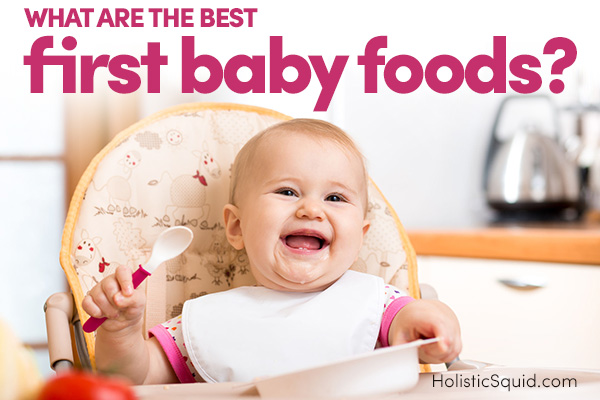
First baby foods guidelines:
-
Unless advised by a knowledgeable practitioner that you trust, avoid solids until 5 – 6 months. The best first baby foods include iron rich foods such as liver, not rice cereal!
-
Avoid jarred baby foods; homemade is easy and healthier
- Introduce potential allergens such dairy, egg, soy, wheat, peanut, and tree nuts sooner rather than later, since early introduction can protect against the development of food allergies
-
No raw honey until 12 months
-
When milk is introduced, raw is best and non-homogenized 2nd best – always organic from grass fed cows or goats
-
If food sensitivities are a concern, introduce new foods one at a time, with a few days between each new food
-
If baby rejects a food, try again in a few days or weeks. Her tastes and needs will change!
-
Cook with a nutrient rich fat such as coconut oil, butter, ghee, lard, or duck fat; olive oil is okay for low to medium heat only
What to introduce, when…
5 – 9 months
- Liver, pan seared for baby to hold or blended with homemade stock
- Red meat and poultry
- Fatty fish such as wild caught salmon and sardines
- Homemade bone broth (read more about nutrient-dense first foods here)
- Organic egg yolks (if you're up for it, grate frozen organic liver onto the eggs for added nutrition)
- Whole organic eggs (preferably from pastured chickens), try cooking it flat and slicing into strips that baby can hold
- Organic full fat yogurt and kefir
- Occasional wheat, rice, and other grains properly prepared for the sake of allergy prevention, not nutrient density
-
Mashed bananas, choose ripe and browning ones to avoid a constipated baby
-
Stewed fruit (apple, prunes)
-
Cooked and pureed veggies (take it easy on orange veggies so that you don't overload your baby with beta-carotene, and puree veggies with homemade stock)
- Pureed soups (make with homemade stock from chicken, beef, or fish)
- Scraped or mashed avocados
- Coconut and hemp oils and butters, olive oil, butter or ghee, lard, and duck fat
- Peaches, nectarines
10 – 12 months
- Cheese (raw is best, try goat first)
- Blueberries, papaya, mango
- Beans, hummus
12 months
- Raw honey, melons, oranges
Choose an organic, whole food, seasonal diet including…
- Fruits, vegetables
- Soups, stews
- Fats, fish oil, butter, avocado.
- Organic, free-range meats and eggs (preferably from pastured animals)
- Whole grains
- Beans, nuts
Foods to Avoid…
- Corn syrup, sugar, fruit juices
- Partially hydrogenated oils, restaurant fried foods
- Processed grains, white flour
- Highly processed dairy products, soy
- Artificial sweeteners, preservatives, colors
- Reduced fat foods
Got more baby food Qs?
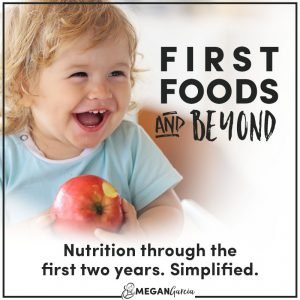 How much do you feed your baby? When? And what about recipes or some kind of meal plan?
How much do you feed your baby? When? And what about recipes or some kind of meal plan?
If you've got more questions about how to begin solids with your wee human, head over to First Foods and Beyond.
In her program, Megan Garcia shares tips on how to introduce solids, a 3-step meal plan that you can customize to fit what's in your fridge, a handful of nutrient-rich baby food recipes, and a DEEP look at probiotics. Click here to access the program now.



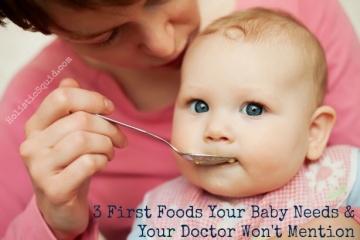

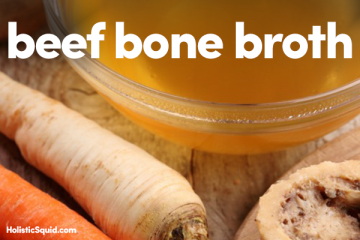



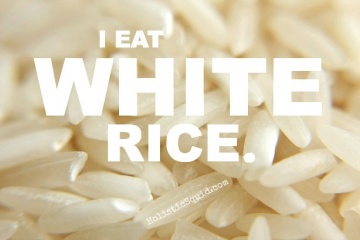

I need help!! It is time to start introducing foods to my 6 month old baby boy and I need help!!! I want to introduce bone broth as his first food but his doctor refuses to accept ANY first food other than rice cereal. We are about to move and when we get there I plan on finding a pediatrician a little more suitable for our lifestyle but until then I need to figure out feeding him on my own but I can’t seem to find the information I need anywhere. Can anyone help me with how to make the bone broth and some type of guidelines on how much to feed him for how long?
Hi Laurie, here are some other posts you may find helpful.
How to make chicken broth
3 First Foods
xoxo Emily
What are your thoughts on rabbit bone broth? We raise rabbits for meat & I make a lot of soups with the broth.
Hi Jaclyn, that is great – you’ve got to use the resources you have. xoxo Emily